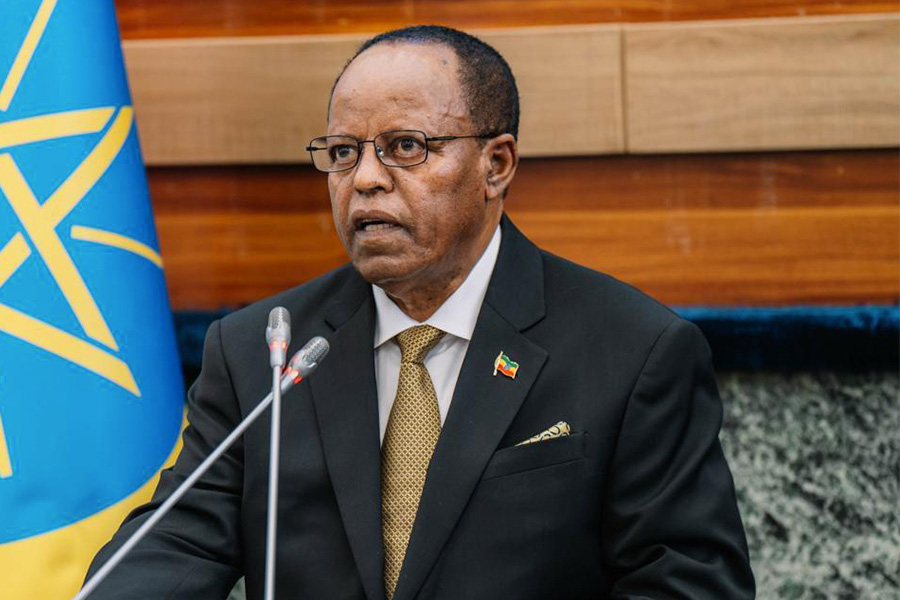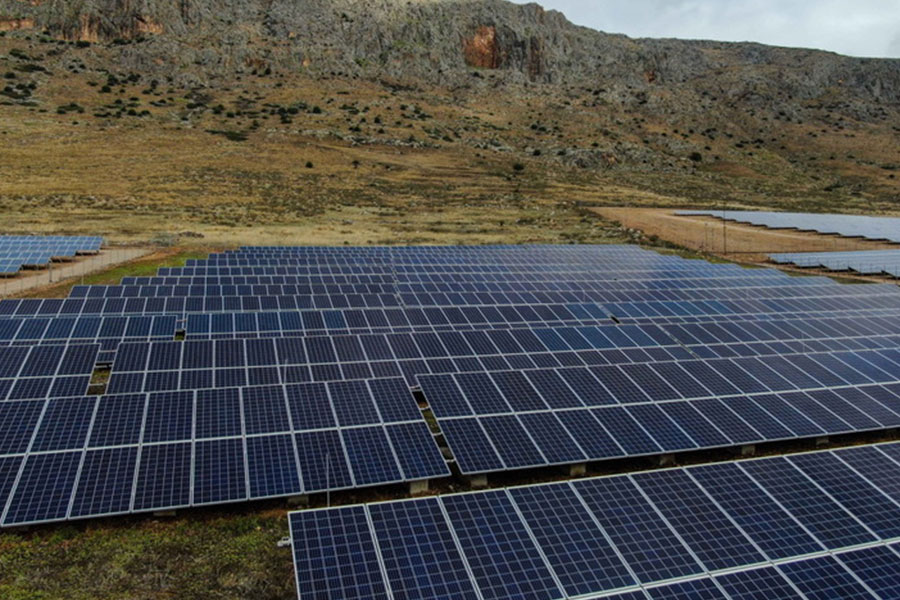
The seats and ambience inside are expectedly comfortable, with typically clean minimalist touches. The cabin feels eerily silent, free from the roaring sounds of an engine and the whistling of a turbocharger. It may resemble a conventional vehicle, but its DNA is markedly different. It has no gearshift, no sound and no combustion engine.
This is no ordinary car. It is an electric car made in China.
In the driver’s seat was Kidem Tesfaye, chief executive officer (CEO) of Green Tech Africa. He was cruising the streets of Addis Abeba - confidently - in the four-seater automobile.
While internal combustion engines require multiple gears with different ratios for power output, electric motors produce a consistent amount of twists. Electric cars do not need gears and transmission, enabling a smoother, noise-free driving experience.
Kidem had been driving conventional petrol and diesel cars for 25 years. The latest model he drove was a Tucson, an SUV manufactured by the South Korean Hyundai. But nothing he has ever driven matches his experience in the electric car. Without an internal-combustion engine creating a four-stroke soundtrack of spinning belts, pistons pumping, exhaust tones, and forced induction, drivers and passengers are much more aware of every sound in the cockpit.
“Driving this car is unnervingly easy,” says Kidem.
The Ana 360 model electric car he now drives came with a price tag of 1.85 million Br. At full charge, it can be driven up to 360Km.
Kidem’s car is one of over 1,000 vehicles that Green Tech Africa, a company incorporated two years ago, recently imported from the Chinese car manufacturer Dongfeng Motor Corporation. Dongfeng has been one of China’s leading car brands in business since 1968. Its dump trucks are well-known in the Ethiopian construction industry.
Dongfeng supplied six electric car models to Green Tech, 380 of them this year. Many have been sold, according to Kidem.
The remaining are parked in the company’s showroom near the former Qality Metal Factory on the capital’s outskirts. Close to a dozen models are lined up outside the three-storey showroom. The inside comprises 30 electric vehicles, including 23-seater midi-buses, pickup trucks, and buses that require no fuel to drive. Several of the cars displayed in the showroom are the Ana 200, Jan 450, and Nangang models.
The former carries a price tag of 1.5 million Br and can travel up to 300Km on a single charge. The Jan 450 model runs for 450Km at full charge and costs up to 2.7 million Br.
Resting on 30,000sqm of land in the Nifas Silk District, Marathon Motor’s assembly plant was erected for close to one billion Birr with the capacity to assemble 10,000 vehicles a year.
A subsidiary of Shemu Group, a conglomerate comprising 15 companies, Green Tech Africa was incorporated with 1.2 billion Br capital. Founded in 2009 with Wolday Kahsay as a significant shareholder and 4.5 million Br capital, Shemu also owns an edible oil plant. Its plant in Dire Dawa can refine up to 950tn of palm oil a day.
Green Tech Africa, with a presence in Kenya, Rwanda, Tanzania and Uganda, plans to import 5,000 electric cars in the coming five years.
The arrival of the first electric vehicles spun heads during a launching ceremony Green Tech organised at Friendship Square two weeks ago. Sixty of the cars were displayed for visitors, including Dagmawit Moges, minister of Transport & Logistics. She took one of the cars for a test drive.
Green Tech Africa has been offering free transport services in the capital as part of a promotion. The buzz did not go unnoticed by Gulelat Mekonnen, who came to the capital from Hawassa on a business trip earlier this month. A dealer in the machinery rental business, he bought a Jan 450 model.
“It’s a present to my uncle,” Gulelat told Fortune.
Electric vehicles’ rechargeable batteries make them more efficient and less costly to operate than their gas-powered counterparts.
The expansion of electric cars is welcome news for the transport and logistics authorities, who find it challenging to cope with fuel subsidies. Initially planning to phase them out, federal authorities have adjusted gas station prices to their highest-ever levels. Retail prices for a litre of benzene climbed by close to 30pc to 47.83 Br. Diesel soared to 49.02 Br a litre, constituting a 40pc increase.
The benefits of the broader use of electric cars are hard to miss for a developing country like Ethiopia, whose government spends billions of dollars annually importing fuel. Ethiopia spends four billion dollars annually to import fuel through the state-owned Ethiopian Petroleum Supply Enterprise.
Oil prices have been rising globally after falling to record lows during the peak of the COVID-19 pandemic. Speculations and uncertainty from Russia’s war in Ukraine have pushed the price of crude oil to over 100 dollars a barrel.
Minister Dagmawit says electric vehicles are vital in the government’s ambitions to decarbonise the transport and logistics sector. The federal government has been experimenting with carbon-free mass transportation since introducing the capital’s light-rail service eight years ago.
When inaugurated in 2015, after three years of construction and 475 million dollars in investment, the rail was initially touted as the ultimate remedy for the city’s transportation crisis and hoped to ease traffic congestion. The 34Km rail line, stretching from Ayat to Tor Hailoch and Menelik II Square to Qality, was designed to serve 80,000 commuters a day. A month ago, transport authorities announced plans to launch an electric Bus Rapid Transit system for 15 corridors.
Commercial and passenger electric vehicles have been making their way into roads at an increasingly rapid pace. Last year, nearly 10,000 electric vehicles (including semi- and completely knocked down parts) were brought in for 44.3 billion Br. It was more than double what had been shipped the year before, for 15.9 billion Br. Nearly 90pc of these vehicles were imported from China, accounting for 60pc of global electric car production.
Global electric cars’ sales (including fully electric and plug-in hybrids) doubled in 2021 to a new record of 6.6 million, according to the latest edition of the annual Global Electric Vehicle Outlook. China shipped off nearly half a million that year, triple its export volume in 2020. However, the US-based Tesla remains the most recognised brand in the electric vehicle market.
Nonetheless, electric vehicles have a long way to go before supplanting their fossil-fuelled counterparts. They account for only 10pc of the global market. Experts estimate there will be 40 million electric vehicles on roads across the globe by 2030.
Dagmawit and her deputies plan to encourage the use of electric cars in Ethiopia, with ambitions to introduce 4,800 buses and 148,000 automobiles in the coming decade.
This is good news for Green Tech Africa, which is erecting a vehicle assembly plant on a 10,000sqm plot in Dire Dawa.
However, pioneers’ experience in the industry is anything but encouraging.
The road travelled by managers of Marathon Motors Engineering, the sole importer and assembler of Hyundai models, the future will not be without pitfalls.
Cofounded by Haile Gebreselassie, an Olympic medalist-cum-businessman, and two shareholders, Marathon Motor’s assembly plant was inaugurated in 2019. The assembly plant rests on 7,900sqm of land in the Nifas Silk District, southwest of the capital. It was erected for close to one billion Birr to churn out 10,000 vehicles a year. Two of the Hyundai models in its portfolio are electric cars.
Foreign currency shortages have limited its activities. Marathon has assembled 1,100 vehicles over the past three years. Of the 22 electric cars that left the assembly, the company bequeathed its first to Prime Minister Abiy Ahmed (PhD). Marathon had been operating at less than 10pc of its capacity before suspending operations last month. Haileleuel Tadesse, the plant’s manager, disclosed operations were halted due to a foreign currency crunch. Marathon Motors requires 40 million dollars a year to import parts.
Most of the 340 employees were nowhere to be seen in the plant last week despite the high demand the company receives for electric vehicles.
“We were producing way lower than our capacity,” said Haileleuel.
Another electric car assembler is Tom Electric Vehicles, which was incorporated four years ago. It has assembled 1,000 electric automobiles, three-wheelers, minibuses, and scooters. Its managers, however, say it is a fraction of the plant’s production capacity.
Kidem from Green Tech Africa shares their concerns.
“It deserves the government’s attention,” he said.
Federal officials concede government support for the fledging industry has been insignificant.
“The government has begun responding to investors’ demands,” said Tatek Negash, communications head of the Ministry of Transport & Logistics.
Federal transport authorities are working on an automotive policy that outlines government support for vehicle assemblers. Two years ago, officials at the Ministry of Finance lifted the excise tax imposed on imported electric vehicles and parts. However, Kidem says high duties push prices for electric vehicles. They retail for a little more than petrol models.
Daniel Girma, an automotive engineer who had worked at Mesfin Industrial Engineering, points out another issue. Parts for electric vehicles are hard to come by.
“Unlike conventional cars, you can’t find them,” he said.
These are issues that mean little to Gulelat. He ordered another electric car from Green Tech Africa before driving back to Hawassa in the model he bought for his uncle.
“My work requires me to move from place to place often,” he says. “With the rising fuel prices, I can’t continue to depend on a petrol car.”
PUBLISHED ON
Jul 30,2022 [ VOL
23 , NO
1161]

Fortune News | Mar 23,2024

Commentaries | May 13,2023

Commentaries | Aug 30,2025

Sunday with Eden | Jul 02,2022

Fortune News | Nov 14,2020

Radar | Jun 30,2024

Commentaries | Jun 20,2020

Radar | Dec 19,2021

Commentaries | Sep 02,2023

Fortune News | Oct 08,2022

Dec 22 , 2024 . By TIZITA SHEWAFERAW
Charged with transforming colossal state-owned enterprises into modern and competitiv...

Aug 18 , 2024 . By AKSAH ITALO
Although predictable Yonas Zerihun's job in the ride-hailing service is not immune to...

Jul 28 , 2024 . By TIZITA SHEWAFERAW
Unhabitual, perhaps too many, Samuel Gebreyohannes, 38, used to occasionally enjoy a couple of beers at breakfast. However, he recently swit...

Jul 13 , 2024 . By AKSAH ITALO
Investors who rely on tractors, trucks, and field vehicles for commuting, transporting commodities, and f...

Oct 4 , 2025
Eyob Tekalegn (PhD) had been in the Governor's chair for only weeks when, on Septembe...

Sep 27 , 2025
Four years into an experiment with “shock therapy” in education, the national moo...

Sep 20 , 2025
Getachew Reda's return to the national stage was always going to stir attention. Once...

Sep 13 , 2025
At its launch in Nairobi two years ago, the Africa Climate Summit was billed as the f...